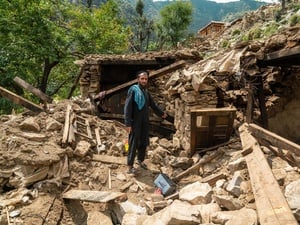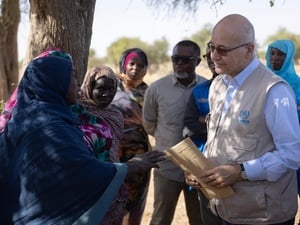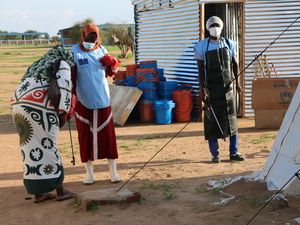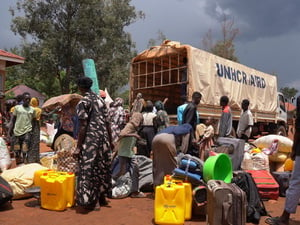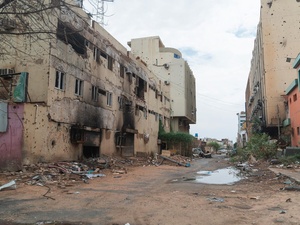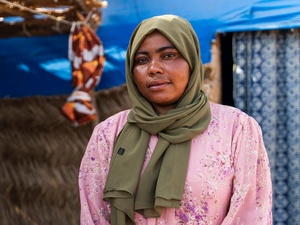Darfur: concern that many IDPs may yet flee to Chad
Darfur: concern that many IDPs may yet flee to Chad
Our new director of operations for the Sudan situation, Jean-Marie Fakhouri, has heard from a large number of internally displaced persons (IDPs) in West Darfur that they may flee to neighbouring Chad if no credible measures are taken to make them feel secure inside Sudan.
Fakhouri, continuing his visit to the region after five days in Chad, met Wednesday with some 300 IDPs (who represent about 30,000 displaced people) in Masteri, a large village 50 km south of El Geneina that has swollen with the arrival of people displaced from other communities across the region.
The people, who fled attacks on their own small villages earlier this year, say they are virtual prisoners inside Masteri. When they venture outside, they are regularly attacked by Janjaweed militiamen. Fakhouri was very moved by one man's story of how his mother was killed the day before by Janjaweed who stole her cattle.
A 43-year-old woman told members of Fakhouri's team that she was one of many women who had been raped when she went out of Masteri for food and firewood. She said women are being raped every day, but they continue to go out because the men will be killed if they venture out.
This group of displaced people said they want protection from UN peacekeepers, an unlikely prospect. If they do not get international security guarantees, they said, they will all cross to Chad as soon as the rain-swollen river that marks the border with Sudan dries up. We are concerned that such an influx of 30,000 refugees in one single spot along the Chad-Sudan border, if it were to materialise, would put a strain on our ability to care for and feed refugees in our camps there.
Refugees interviewed at the border and at UNHCR camps in Chad say there are thousands of others waiting to cross, but they said the Sudanese authorities are exerting military pressure and carrying out propaganda campaigns on the radio and through village chiefs to prevent them from leaving. The refugees said they had been told that there was no help for them in Chad. In some cases they said they were promised food and water to help them survive after their villages had been burned, but the promised aid never arrived and the attacks on their villages continued. Numerous refugees interviewed by UNHCR staff said they had been able to cross only after hiding from the Janjaweed and military and travelling only at night to avoid detection. A number of refugees say they have crossed back into Sudan at times to take care of the cattle they left behind or see relatives who could not make the crossing because of their age or illness. But they said they returned to Chad after being attacked by Janjaweed and military forces who also decimated their cattle herds.
We're also seeing a rapid increase in the number of spontaneous arrivals at our Chad camps of refugees who had previously insisted on remaining along the border. As of this week, there were still an estimated 18,000 refugees encamped along the border. Many are now moving to the camps because they say they are running out of food, have given up hope that peace will return soon to their homeland, and are seeking shelter from the heavy rains in the region. Overall, 7,345 spontaneous arrivals have been registered so far this month at four of our nine camps: Breidjing, Oure Cassoni, Mile and Konoungo. The refugees say that with supplies dwindling and their animals dead or stolen, the refugee camps have become their only chance for survival. Many had been living with friends and family who belong to the same ethnic group, but resources are running out.
Along the border north of Tine, our staff have counted nearly 1,500 people who now want to go to a camp because they have run out of food. UNHCR has proposed a one-time assistance in provisions and plastic sheeting until they can be moved to the new camp that is being constructed at Mader and which should be ready in about a month.
On Saturday, UNHCR and the World Food Programme, with our partner World Vision, launched a major effort to reduce the high levels of malnutrition among refugee children in UNHCR's camps in eastern Chad. A blanket supplementary feeding programme will bolster measures we and our partners have already taken such as improving water supplies, increasing measles vaccination coverage, and deploying additional health and nutrition experts. These efforts are the result of recommendations of a joint agency nutrition survey conducted in June that found high levels of malnutrition among refugee children in three camps and in one area at the Chad-Sudan border where refugees had spontaneously gathered, as well as among the local Chadian population.
The blanket feeding for all children under five and pregnant and lactating women started on Saturday in Oure Cassoni camp and will be expanded to the other eight camps for an initial five month period. Hygiene and nutritional advice will be given to mothers including prevention of diarrhoea and the preparation of corn-soya blend - a non-traditional food - to ensure the full nutritional benefit is gained. Awareness courses on breast feeding and feeding practices will also be provided. Water supplies have improved in the camps, particularly the overcrowded Breidjing camp, where refugees now have 12 litres of purified water per person per day. UNHCR has airlifted in 10 tons of sugar to boost the existing feeding programmes and has purchased food supplies such as high-energy milk for therapeutic feeding for the most severely malnourished children. The therapeutic food is scheduled to arrive next week.
The June survey was an interagency effort by UNHCR, the US Centers for Disease Control and Prevention (CDC), UNICEF, WHO, WFP, the Centre National de Nutrition et Technique Alimentaire, MSF Belgium, IMC, IRC and the Chadian Ministry of Health.




